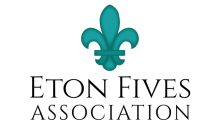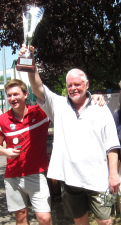
Ronald Pattison (1950 – 2024)
An Obituary
Gordon Stringer writes:
10/04/24: All involved with Eton fives were deeply saddened to learn of the death of Ronald Pattison at the age of 73.
Ronald was, quite simply, a lynchpin of the Eton fives community. An Old Carthusian, he played a large part in restoring to life the ailing game at Charterhouse, both through his work with the school and the resident Brigands Club. Ronald was a fine player, skilful, wily, agile for a large man, and determined – not to say combative. Unusually, he became a better player as he got older. He won the National Veterans Over 60s with Joe Seelig, the John Reynolds Trophy with Marc Mettler, the Benny Oei Trophy twice with Alexander Heuberger (2014) and Jack Chang (2017) and as a guest, the Old Citizens' Adams Cup with Stephen Kelly.
Ronald was also an active administrator: he gave distinguished service to the EFA for many years as a Trustee, Vice Chairman and Vice President and he served for ten years on the committee of the former Fives Federation. His role as the Eton Fives representative for the Jesters greatly enhanced the sport’s profile within the club.
Many fives meetings were hosted at Ronald and Louise’s home in Barnes where they were the perfect hosts.
Eton fives was one of Ronald’s main loves, and he devoted so much of his restless energy to its development. Many will remember him as an evangelist for the social side of the game: he saw it as a way to form, develop and cherish friendships. He was committed to involving women and girls in what had for so long been an all-male preserve. He enthusiastically dedicated much time to helping to arrange fixtures, raising teams, offering lifts and even finding players for the other side. He formed a particular affinity with the Old Citizens, and he travelled with them to Zuoz, Zurich and Geneva. He also played in the opening matches on Nigel Cox’s courts in Grillon, France. Even in recent months, as he battled his illness, he would be at the back of the court at every major tournament, whatever the weather, enthusing all he met.
Ronald was born in Calcutta, a source of great pride to him, as he was eligible to represent India as well as England at cricket. Sadly, the call never came. Shortly after the family returned to England, his father contracted cancer and died. Ronald was brought up by his mother in Haywards Heath and later Cuckfield. She then married a local dentist, a situation that was not without its tensions. Ronald moved from Seafields Prep School to Charterhouse in 1963 where his love of fives began.
After school, Ronald enrolled on a management training scheme. He then attended Heidelberg and Munich universities and later the Sorbonne. While in Munich, he was attached to the British Olympic boxing team as an interpreter and there were occasional glimpses on television of Ronald acting as a second. One evening, ‘out on the town’, a member of the team got into an unscheduled fight and Ronald had to take him to an emergency dentist, where he acted not only as translator, but also as dental assistant. Maybe he thought his stepfather’s profession would stand him in good stead but alas not: he fainted in the middle of the procedure.
On his return to England, Ronald decided that his future lay in the law. After completing his articles, he was sent to Lisbon for six months and on his return to the UK, and after passing his law exams, he secured his first job as a solicitor. One day, while applying for a Directions Order in the courts, he found himself opposed by a beautiful legal executive. The professional encounter developed into a romance and Ronald and Louise were married in 1982. “You can be sure”, said her mother, “that life with Ronald will never be dull.”
Ronald and Louise had three children: Laura, Frances and Michael. When Michael was at Stowe, Ronald volunteered his services to the school as a fives coach, an area in which they were ill equipped at the time.
Ronald’s voracious appetite for expansion helped to grow and modernise the law firm of which he became a senior partner. Later, as an independent legal and property consultant, he guided numerous people and organisations to see and seize opportunities. What gave him most satisfaction was to open up horizons that people had not before considered.
When Ronald was diagnosed with advanced bowel cancer, it seemed to spur him to even more frenetic endeavour. He saw the disease as no barrier. Only a few months before he died, he listed no fewer than ten different projects he was actively planning. Not everyone saw eye to eye with him, but he saw that as no obstacle. Although such entrepreneurial vision could be hard to live with, not to say exhausting, he was always looking forward and rarely glancing back.
In his last few years, Ronald found great spiritual strength in his local church and became a friend of many. He was asked what advice he would give to anyone else going through his cancer treatment. Without hesitation, he said: “Keep very busy and have a go at as many things as possible that you’ve always wanted to do; reconnect with as many family members and old friends as you can, especially with those you may have been on uneasy terms with; stay positive at all times and never, never believe anyone, especially the medics, who tell you you’re not going to get better.”
Any encounter with Ronald would be memorable, motivating and enjoyable. His bold voice and his wonderful laugh will still resonate with many. He was an inspirational figure who had a varied and full life, mainly in giving guidance to whoever sought his wisdom. He loved and was loved in return. Above all, he and Louise took enormous pride in their three children, and all have been excited over the recent addition of grandchildren. The family has made reflecting on Ronald’s life a joyful process.
Eton fives will be the poorer for the loss of one of the game’s most characterful devotees. Great company, feisty, energetic, optimistic, up for the fun and the fight, not one to give up. And he took these qualities into his last contest. It was one that supposedly he couldn’t possibly have won, and yet with his detailed, upbeat reports of his treatment and progress, he made us believe that he could.
Ronald died in the Marsden Hospital with his family around him. For the last days of his life, he was holding onto a fives ball and died with it in his hand. So, in typical style, he left us all, in the midst of our sorrow, with a smile on our faces.
Our deep condolences go to Louise, Laura, Michael and Frances.
Gordon Stringer (with acknowledgement to the Pattison Family; Richard Barber; Matt Chinery; Dale Vargas; John Witherington; Joe Seelig.)












